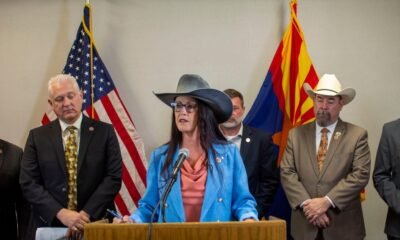Bill Gates
Matt Salmon: A Bold Push to Reignite Republican Values

Eight years after leaving Congress, former U.S. Representative Matt Salmon has emerged as a prominent critic of the Republican Party in Arizona. Teaming up with enforcement officials and like-minded conservatives, including Maricopa County Recorder Stephen Richer and former state Senator Paul Boyer, Salmon is leading a new initiative called the Conservative Agenda for Arizona. The group’s mission is to create a welcoming space for conservatives within the state’s shifting political landscape.
Salmon has voiced concerns that many Republicans feel disconnected from the party’s current direction. He argues that the rise of conspiracy theories and election denialism has strayed conservatives from core principles such as limited government, lower taxes, and strong national defense, values that he believes should define the party.
The Conservative Agenda for Arizona has already made strides since its inception, launching a website and holding a kickoff event featuring former Governor Jan Brewer. Salmon aims to recruit individuals who share their vision and focus on drafting practical policies that resonate with conservatives.
Key policy proposals are on the horizon, including advocating for lower taxes and regulations. Salmon emphasizes the need for a balanced budget amendment to compel Congress to adhere to fiscal responsibility. He cites his experience in Congress, where he participated in efforts that resulted in a balanced budget over four consecutive years.
Addressing skepticism around election integrity, Salmon believes that persistent communication of facts is critical. He references numerous unsuccessful lawsuits that have attempted to challenge election results and asserts that the Republican Party must restore its commitment to the rule of law. He draws inspiration from historical figures like John Adams, stressing the importance of sticking to verifiable truths.
Reflecting on his congressional tenure, Salmon notes the increased polarization that characterizes today’s political climate. He remarks that the advent of social media and round-the-clock news coverage has exacerbated misinformation and unkind discourse. Unlike his earlier time in office, the current atmosphere features far fewer moderates, contributing to a divided legislature.
Salmon remembers his proudest achievement: overseeing the federal budget’s balance for the first time in over four decades. By the time he left office, there was a surplus of $140 billion, fulfilling his primary concern about public debt.
However, his position came with challenges. Salmon spoke candidly about the toll of long absences from his family and the pressures exerted by party leadership to conform. He criticized a system where party loyalty overshadows the representative duty owed to constituents.
The exclusive committees in Congress—such as Energy and Commerce, Ways and Means, and Appropriations—favor those who can contribute substantially to party fundraising, rather than those with subject matter expertise. Salmon stresses that this undermines public trust and expectation.
Since leaving Congress, Salmon has enjoyed more family time and the freedom to express his views unrestrained by electoral considerations. He notes that many retired politicians fear speaking candidly due to potential backlash from party affiliations, contributing to a troubling atmosphere of political tribalism.
On the issue of term limits, Salmon advocates for them as a means to liberate lawmakers from the fear of job security, which he argues stifles genuine representation and accountability.
Considering the forthcoming elections, Salmon expresses concern over potential unrest, reflecting a widespread anxiety among voters. He urges a return to civility and understanding in discussing political beliefs, lamenting the growing division that often ends in hostility.
Salmon has also voiced disappointment over the evolution of the House Freedom Caucus, which he feels has shifted from its original fiscal accountability mission to mere allegiance to former President Trump. He argues that the party should uphold conservative principles rather than indulge in the politics of personality.


















